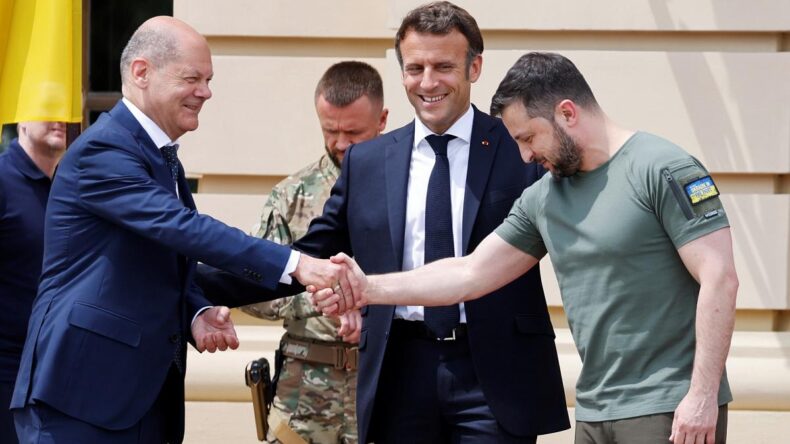The European Union (EU) has decided to offer official membership status to Ukraine. This is regarded as a historic step taken by the Union. The process of Ukraine’s joining the bloc might take longer than ten years. See here.
The EU’s decision to formally accept it as a candidate, however, is a sign that it intends to expand its influence throughout the former Soviet Union.
The EU has moved swiftly and uniformly out of character to bind the beleaguered nation more tightly to the West and yank it further from the influence of Russia. This decision strikes a blow against Vladimir Putin and opens the door to the war-torn nation joining the EU.
The decision was taken only one day before President Vladimir Putin’s soldiers would have been in Ukraine for four months for what Russia said was a “special military operation,” not a war.
On Thursday evening, EU leaders discussed the ongoing conflict at a meeting in Brussels. They finally decided to approve Ukraine’s candidacy.
In addition to Ukraine, Moldova was also given candidate status.
The decision has received worldwide attention. Ursula von der Leyen, President of the European Commission, called it to be a “good day for Europe.”
According to French President Emmanuel Macron, the decision was historic and sent “a powerful signal towards Russia in the prevailing geopolitical context.”
Russian-Ukraine conflict at glance
Ukraine and Russia have shared cultural, linguistic, and familial links for hundreds of years. Ukraine was the Soviet Union’s second-most powerful Soviet republic after Russia. It was a significant member from a strategic, economic, and cultural standpoint.
The Ukraine crisis is built on a fight over post-Cold War central European territoriality and the resurrected Russian history.
Even after the demise of the Soviet Union and the Warsaw Pact, NATO’s growth as a politico-military alliance was a U.S. endeavor aimed at moderating European aspirations for strategic autonomy and counteracting Russia’s revival.
On February 24, Russian President Vladimir Putin launched the most devastating war in Europe since World War II.
He justified his actions by claiming that modern, Western-leaning Ukraine was a massive threat to Russia’s “safety, development, and existence.”
Since then, thousands of people have died, villages and cities like Mariupol have been destroyed, and almost 13 million people have been forced to move.
Russia’s leader declined to label the situation as an invasion or a war. Moscow refers to it as a “special military operation.”
The imbalance of power in the region, Ukraine’s vital role as a barrier between Russia and the West, Ukraine’s application for NATO membership, and Russian interests in the Black Sea—all of which are accompanied by protests in Ukraine—are the main causes of the ongoing war.
The Russian-Ukraine conflict and India’s stance
India has sought for “a peaceful resolution of the issue via continuous diplomatic efforts for long-term peace and stability in the area and beyond.”
On the fiscal front, the government, which has been conservative in its revenue assumptions in the Budget, should curb on domestic fuel taxes ahead of time to nip the expected inflation, stoke faltering consumption levels, and sustain India’s fragile post-Covid-19 recovery through this geopolitical churn.
India ties with Russia have ensured that Delhi is not completely divorced from the discussions on Afghanistan and Central Asia, while also offering some leverage with the US.
It will need to strike a balance between pressure from one strategic partner to denounce the violation of international law and persuasion from another to recognize its reasonable reservations.
At the same time, the United States, the European Union, and the United Kingdom are all essential partners, and India’s connections with each of them, and with the Western world in general, go much beyond the sum of their parts.
Despite the symbolism, the status represents a geopolitical success for Ukraine, a war-torn country that was never considered a genuine contender for entry into the EU until early this year. The situation is about to change dramatically now that Ukraine has been granted EU membership.
We will have to wait and see how Russia respond to this move.












